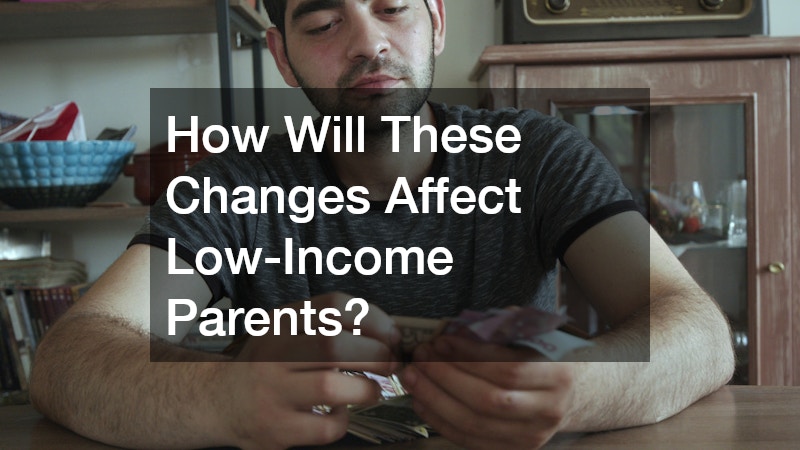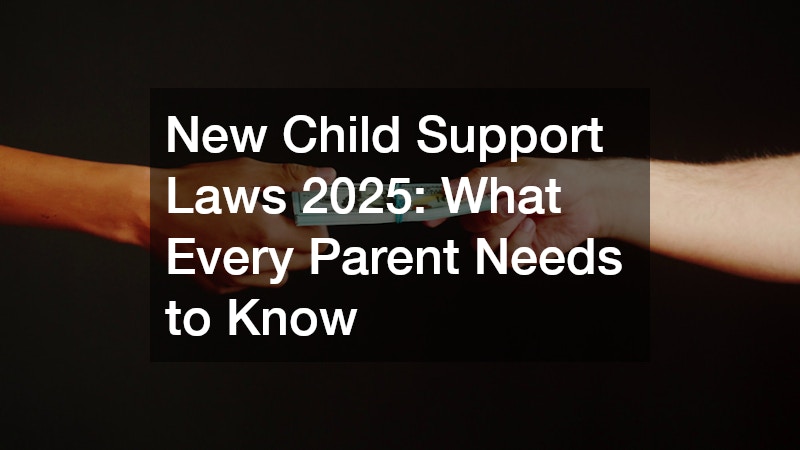Understanding child support laws is essential for anyone involved in parenting, whether you’re recently divorced, separated, or co-parenting in any form. In 2025, significant updates to child support legislation are set to reshape how obligations are calculated, enforced, and adjusted across many states. These changes aim to provide a more equitable system for all parties involved, especially the children at the heart of these cases.
In this article, we’ll break down the most important changes introduced in 2025, what they mean for parents, and how to navigate this new legal terrain. Whether you’re a custodial or non-custodial parent—or just someone curious about family law—this guide will give you the clarity you need.
What Has Changed in the New Child Support Laws for 2025?
Child support laws vary by state, but 2025 marks a nationwide shift in how states handle key aspects of these obligations. While each jurisdiction has its nuances, several broad updates have emerged as part of the push toward a fairer, more transparent process.
Here’s what’s new:
- Revised Income Definitions: More income sources are now counted in support calculations, including gig work, crypto earnings, and freelance income.
- Standardized Parenting Time Adjustments: A push to standardize how overnights and shared parenting time affect payment obligations.
- Faster Modification Processes: Parents can now request support modifications more easily through simplified online portals in many states.
- Updated Poverty Guidelines: Calculations have been adjusted to reflect inflation and rising living costs.
- Stronger Enforcement Measures: Automated wage garnishments and license suspensions are more readily applied for delinquent payments.
These changes are designed to create a system that better reflects modern family dynamics, economic realities, and the growing number of non-traditional work arrangements.
Why Were These Changes to Child Support Laws Necessary?
The family court system has long faced criticism for outdated policies that don’t reflect modern-day parenting or economic structures. With rising inflation, gig economy growth, and changes in custody arrangements, old systems no longer served the majority.
For years, advocacy groups, parents, and lawmakers called for:
- Fairer calculations for shared custody
- Acknowledgment of multiple income streams
- Faster processing for modification requests
- Protection against legal backlogs and enforcement delays
By updating these laws, courts hope to reduce conflict between co-parents, increase compliance, and ensure that children’s best interests remain the top priority.
How Do the 2025 Child Support Changes Affect Custodial and Non-Custodial Parents?
This is one of the most common concerns for parents adjusting to the new laws. The impact varies depending on your custody arrangement, income level, and existing court orders.
If you’re a custodial parent, you might see:
- More consistent payments due to stricter enforcement tools.
- Easier access to modify support if income or custody changes.
- Better online systems to manage and track payments.
If you’re a non-custodial parent, expect:
- Adjusted payment amounts if you share significant parenting time.
- Inclusion of side income (freelance or gig work) in your income evaluation.
- Easier modification if your financial situation changes, such as job loss.
These laws aim to remove the long-standing bias that one parent always bears the brunt of financial responsibility and instead shift toward shared, balanced accountability.
What Income Counts Now in Child Support Calculations?

Under the 2025 updates, there’s a more comprehensive definition of “income.” This change primarily targets those who previously underreported or worked freelance jobs to avoid higher payments.
The following income sources are now generally included:
- Full-time and part-time employment
- Gig economy jobs (e.g., Uber, DoorDash, Fiverr)
- Freelance contracts
- Rental income
- Royalties and passive investments
- Cryptocurrency earnings (where trackable)
- Bonuses and commissions
States have implemented clearer guidelines and technology to detect, verify, and include these income streams in the child support formula. This ensures that parents who earn money outside traditional employment structures still contribute fairly to their child’s well-being.
Can You Modify Your Existing Child Support Order in 2025?
Yes, and it’s encouraged if your financial or custody circumstances have changed.
The modification process has been streamlined:
- Online Portals: Many states have introduced digital platforms for support reviews.
- Shorter Waiting Periods: Instead of waiting 2–3 years, parents can now request modifications after as little as 6 months (depending on the state).
- No Legal Representation Required: Basic cases no longer require a lawyer, thanks to online self-help forms and virtual hearings.
This is a significant improvement from previous years, where modifications could take months and involve costly legal proceedings. Now, families can adapt more quickly to changing life circumstances, like layoffs, relocations, or shifts in custody.
How Are Shared Custody Arrangements Treated Differently?
The 2025 child support law changes recognize that many parents now share custody more equally. Courts now place greater emphasis on:
- Number of overnights spent with each parent
- Proportional income contributions
- Day-to-day responsibilities and expenses
Previously, even a 50/50 custody arrangement could leave one parent paying significantly more. The new formulas aim to balance support more equitably based on actual time spent with the child and shared costs.
This change has received widespread support from co-parents advocating for equal parenting rights and responsibilities.
What Happens If a Parent Fails to Pay Child Support in 2025?
Enforcement tools have become more automated and far-reaching under the 2025 reforms. While the goal isn’t to punish parents, the system is designed to ensure consistent payments.
Common enforcement actions now include:
- Automatic wage garnishment
- Tax refund interception
- Suspension of driver’s or professional licenses
- Liens on property or bank accounts
- Contempt of court filings and potential jail time
States have also improved communication between departments, meaning your child support status may affect your ability to renew a passport or apply for loans.
That said, courts also emphasize preventative measures, like modification access and income verification tools, to prevent support from becoming unmanageable in the first place.
How Do the New Child Support Laws of 2025 Impact Parents Who Work Remotely or Internationally?
As remote work and overseas employment become more common, the 2025 updates take steps to close gaps in income tracking and support enforcement for cross-border situations.
Key provisions include:
- International cooperation with certain countries under the Hague Convention
- Increased monitoring of digital payment platforms and international banks
- Remote hearings for expats and digital nomads
Parents working abroad or receiving income in non-traditional ways are still expected to contribute fairly. In many cases, courts now request detailed documentation of foreign wages and may require certified translations and currency conversions.
New Child Support Laws 2025: Key Takeaways
If you’re short on time, here’s a quick summary of the most important updates:
- More income sources are now considered, including gig work and crypto.
- Shared custody affects payment calculations more than ever before.
- Online portals make modifying support orders easier and faster.
- Non-payment consequences are stricter and more automated.
- Remote and international workers are still fully accountable.
What You Can Do Today:
- Review your existing court orders and see if modification is beneficial.
- Track all income sources accurately.
- Keep custody schedules well-documented.
- Use your state’s child support calculator with updated laws.
- Seek legal help if you’re confused—many states offer free consultations.
How Will These Changes Affect Low-Income Parents?

One of the main goals of the 2025 child support law updates is to prevent financial hardship among low-income parents while still ensuring children receive adequate support. Under the new guidelines, minimum support thresholds have been adjusted to reflect the current federal poverty level, which provides a more realistic expectation for low-wage earners. In some states, courts are now required to perform a “self-support reserve” test, ensuring that the paying parent retains enough income to cover basic living expenses. Additionally, more states are offering graduated payment plans and temporary relief programs for parents who are unemployed or facing financial emergencies. These reforms aim to strike a balance between supporting children and not pushing non-custodial parents into poverty or incarceration due to non-payment.
Frequently Asked Questions About Child Support Laws in 2025
Do these laws apply to cases opened before 2025?
Yes, in most states, existing child support orders are subject to the new calculation methods if they’re reviewed or modified after January 1, 2025.
Will my child support go up under the new law?
It depends. If you’re now reporting more income or your custody has changed, your support obligation could increase or decrease. The new formula is designed to reflect fairness based on real-life factors.
Is it easier to enforce child support now?
Yes. Most enforcement is now automated through payroll systems, license checks, and digital asset tracking. Non-payment is harder to avoid and quicker to correct.
Final Thoughts: Stay Informed and Stay Compliant
The New Child Support Laws 2025 are a step toward modernizing the family law system. While navigating legal updates can feel overwhelming, the overall goal is to create a more balanced and responsive system for everyone involved, especially the children.
As a parent, the best approach is to stay informed, cooperate with your co-parent, and take advantage of digital tools and state services now available to assist you. These new laws are designed to make life easier for responsible parents and harder for those attempting to dodge their duties.
Stay proactive, organized, and communicative, and you’ll be better equipped to thrive in this new chapter of child support law.

